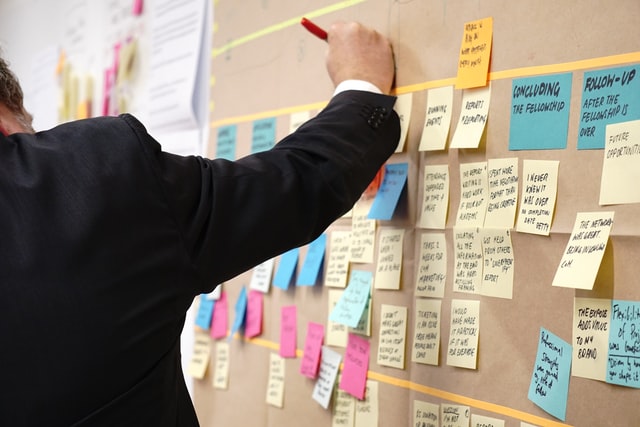The world of work is changing at an alarming rate. The business processes, systems and technologies used five years ago no longer work in today’s world, and it’s safe to say the ones we use now may well become obsolete in the next five years too.
The frequency of these changes means that leaders in this new world constantly need to be adapting if they are to succeed.
But what does the future of work look like? And how can leaders prepare for it?
To help us answer these complex questions, we sat down with Clyde Fernandez, Regional Vice President of Salesforce, all the way down in Australia.
This article will outline some of the main highlights during our fascinating conversation and provide today’s leaders with some guidance on preparing themselves for tomorrow.
You can listen to the full conversation by tuning in to our weekly podcast (Leadership Detectives (buzzsprout.com)) on Buzzsprout, or YouTube version (Leading in the New World of Work: Outstanding Interview with Clyde Fernandez) on The Leadership Detectives website.
We started our conversation off by asking Clyde for his view on the future of work and what that means for leaders:
What is the future of work?
Clyde: “Klaus Schwab said back in 2016, in his book The Fourth Industrial Revolution, that we’re in the midst of a huge shift in the modern workplace. Things are happening and moving in a hyper and far more complex way than ever before and, although that can create opportunities, it also creates a lot of potential problems we need to be aware of.
A term I like to use that describes the world right now is VUCA (volatility, uncertainty, complexity, ambiguity) ….. (more on this to come in a future Leadership Detectives episode!)
It was a term created by the US military to explain certain situations to people so they can learn to survive in them. But we don’t want to just survive; we want to thrive, right?
And in order to thrive in the world of work, we need to know what its future looks like.
Our people today are living through this Fourth Industrial Revolution, which is all about AI, machine learning and robots, and at the same time going through a crisis manifestation as we have never seen before, around health, economy, social justice, climate and leadership.
These are all very human factors, and so we have to think about these changes on a human level.”
The five shifts in the world of work
Clyde: “I like to think about it as five major shifts happening in the world of work:
- Moving from apathy to action: We are moving from a profit-first leadership to an inclusive, ethical, equitable culture, where employees are holding employers accountable for things like equality, sustainability and social causes.
- Moving from always on to finding flow: Warren Buffett and Bill Gates once said that ‘busy is the new stupid’. We need to get away from being busy and this constant inundation of information so we can get into that flow state more often.
- Moving from credentialling to skills: Today, when a person does a technical degree, their knowledge in that first year is redundant by their fourth! As leaders, we’re going to need to help our people to be lifelong learners in context.
- Moving from the notion of bureaucracies and hierarchical structures to humanocracy: Humanocracy is a term we’re using now to provide human agency at every level. We need to allow people to be people because they are the most creative entities within our organisation.
- Move from robots to cobots: We need to stop being afraid of robots. They are here now, and we must learn how to leverage them.
With all these increasing changes, the thing that becomes super important is that we’ve got to become better human leaders.
The way to protect the future of work for your workers is to help them be more human, and to do that, you’ve got to be the role model. You’ve got to be a more human leader and become more humble, more empathetic and more resilient.”
How can we be more human?
This is a fascinating insight on the future of work from Clyde, but how can we become more human as leaders? If humility, empathy and resilience are the key attributes of future leaders, how can we make sure we are showing these traits?
For a lot of people, showing that authenticity and vulnerability is a really scary thing. We asked Clyde how we can drop the facade and get away from our egos:
Teamwork is dreamwork
Clyde: “Firstly, we need to understand that teamwork is mandatory for doing any complex work.
We need the multidisciplinary skills that teams have to accomplish complex tasks, but if you go about these tasks in a ‘command and conquer’ way, your teamwork will only ever be well regulated and well patterned. As soon as you do that, guess what you can replace people with – machines!
What you want is the work which is complex and messy, because humans do that really well, but you need them to work together.
Our number one design point as a human is to reach out and help somebody else lift up. Helping others is self-serving because if I help you by equipping you with more knowledge, you actually improve the corpus of humanity, which helps me because I’m part of that.”
The three C’s
Clyde: “As leaders, we need to make sure we are equipping our people with the three C’s: culture, clarity and coaching.
Culture
In an ever-changing and volatile world, you’ve got to create a culture where people feel safe. Organisations need to be agile through continuous learning and cultivate a fearless environment that encourages people to speak up and contribute ideas rather than hide away.
When we talk about creating a safe place, we are talking about psychological safety. This is not a ‘set and forget’ thing. It’s a fragile capability and needs continual renewal, so, as a leader, driving fear out of your organisation and creating a safe space is your number one priority.
Clarity
There’s so much stuff to go after these days that, as a leader, you’ve got to narrow the aperture and give people a clear vision.
Coaching
I’m a big believer in what I call precision coaching, not broad-based coaching. Precision coaching is in-the-moment, real-time coaching specifically focused on using specific techniques for specific problems.”
Adapting for the future takes courage and constant learning
We love the concept of this new, more human leader who can create a culture of psychological safety, clarity and precision, but being one takes a lot of courage.
When things aren’t going well, it’s natural for people to fall back into old patterns, but you have to be the one to have the courage to try out new things and keep learning wherever possible.
Clyde sums it up brilliantly here:
Clyde: “In the VUCA world we live in, adaptability is the key. And the key to adaptability is learning.
Organisations need to be agile through continuous learning and cultivating, and you need to have the courage to create an environment that encourages that.
The great philosopher Alvin Toffler says that, ‘The illiterate of the 21st century will not be those who cannot read, but those who cannot learn, unlearn and relearn.’
As leaders, we have to become as literate as possible, which means we have to get really good at learning, growing, and encouraging others to do the same.
The only way we can do that is to be more humble, more resilient and, ultimately, more human.”
Solid advice from Clyde there!
We are always keen to chat with anyone about how they can improve their leadership skills, so to get in touch, feel free to reach out to us on neil@xnrg.co.uk OR albert.joseph@excelleration.co.uk.
Alternatively, you can find out more about how The Leadership Detectives could help you by booking a free coaching session with us via our website.
More to come next week!






